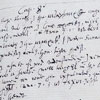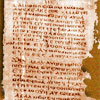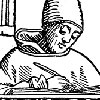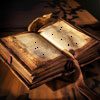Banned Books Of The Bible
 By James Bean
By James Bean
No-stick (Gnostic) Gospels defined: sacred texts that for some reason didn’t ‘stick’ around for very long, were lost, or eventually banned and made illegal with a little help from Emperor Constantine and the Roman military.
Tis a very long list indeed of hidden, banned, forbidden, censored, condemned, cursed, and even burned books. These writings of the banned, holy scriptures were once used by other versions or branches of Christianity that existed in antiquity before it became illegal for them to assemble in public, copy and, heaven forbid! circulate their alternative gospels within the boundaries of the Roman Empire.
Though much has been forever lost, some of these books of the Other Bible have been rescued from destruction. We owe a great deal of gratitude to those freedom-loving and open-minded Jews, Pacomian monks, Christians and Gnostics in Eastern Europe, Egypt, Ethiopia, Turkey, Syria, Iraq, Iran, and Armenia who risked much to translate and thus preserve many of these Other Books for future generations, for all time to come. In the case of the fifty books of the Nag Hammadi library, there were Coptic parchments removed from a near-by monastery library in Upper Egypt and buried in a large clay storage jar not far from some caves near the Nile. This clay jar ended up being a kind of time capsule that was unearthed one thousand seven hundred years later.
One definition of the word “apocryphal” is a holy book used in someone else’s version of Christianity — somebody else’s religion — somebody who went to a different church on Sunday…. or Saturday, or not at all, and yet are rejected by the big church. In a land where everyone is not free to follow the religion of their choice, one person’s treasure of inspiration is another’s kindling.
If it’s banned, it must be good! or at least informative and of historic value.
Banned Sayings of Jesus — He Made the List Too
It may interest you to know that, on the list of forbidden scriptures is included, believe it or not, an impressive early collection of the sayings of Jesus known as the Gospel of Thomas, also the Books of Enoch the Prophet.
Hey Jude!
First Enoch, included amongst the Dead Sea Scrolls — the Essene Bible, and later the Ethiopian Bible, was quoted by Jude in his short New Testament letter. Actually, the Epistle of Barnabas and several major and well-known early church fathers also quoted Enoch, referring to it as “scripture”, once upon a time in what was apparently a somewhat different Christianity back then. Having Enoch included as one’s “scripture” would have made for a radically different religion, much more in touch with it’s Essene Jewish roots. Jude also quoted, back in those free-wheeling grass roots days before the age of book-banning, another scripture eventually forbidden called, The Assumption of Moses.
John the Revelator
It’s interesting to see that the Book of Revelation was banned for awhile. Fascinating to witness! The Book of Revelation by “John” eventually, after years of haggling amongst various factions, ended up as the last book of the “Constintinian” or Orthodox New Testament of the Empire. It has been the focus of so many prophecy speculators, prophecy mongers and cult-abusers over the centuries.
Several other books that are now in Catholic Bibles were once banned — books of “The Apocrypha”. Those were and are part of the Greek Septuagint of Alexandria, literally the Old Testament of the early church (including the book of Judith, other women, also Tobit books of Maccabees, and some very important books of Wisdom). The original King James Version of the Bible in English published in 1611 contained those other books, but now they have largely disappeared in the Protestant world.
Of course! as you might have guessed, the writings attributed to Mary Magdalene made the list, as well as that of another women apostle/leader in early Christianity: Thecla.
The Odes of Love
And the Odes of Solomon was condemned as well. That’s one of my personal favorites. It’s a very beautiful, devotional (bhakti), Sufi-like, eloquent, soul-stirring and very deeply spiritual collection of new testament age psalms. Imagine if you will psalms that sound like they were composed by Rumi. That may give you some idea of what the Book of the Odes is like. I’m glad I am able to own a copy — I have six translations of the Odes.
Wisdom Rejected
Even the Sentences of Sextus made the banned list. I really like that one a lot. It’s a wonderful collection of proverbs, very valuable. Parts of it were unearthed amongst the Nag Hammadi library discovery in Upper Egypt a few decades back.
I have many of the books on this list, especially the Gnostic ones, and some of them represent great literature, the “sutras” and “upanishads” of the Western world, banned by the “Tali-ban” of their day, hardline rulers (archons) devoid of any notion of religious freedom for anyone other than themselves.
Note the official-but-not-so-spiritual-sounding shunning ceremony or “hex-curse” at the beginning of the first banned list: “…convened by the emperor Constantius, the son of Constantine, through the prefect Taurus is damned from then and now and for ever…”, then comes a VERY long list of books to be excommunicated.
Meet the Banned — The So-Called Decretum Gelasianum
Here is the official list of all the banned scriptures of Christianity according to the Synod at Ariminum, which was convened by the Emperor Constantius, the son of Constantine, along with other long lists of banned books.
The following lists of banned scripture is from the book, New Testament Apocrypha, Volume one, Edgar Hennecke, Wilhelm Schneemelcher, and R. McL. Wilson, The Westminster Press.
“In the so-called Decretum Gelasianum de libris recipiendis et non recipiendis, which upon the whole is probably of South Gallic origin (6th century) but which in several parts can be traced back to Pope Damasus and reflects Roman tradition, we have in the second part a canon catalogue, in the fourth part an enumeration of recognized and ecclesiastical writers, and in the fifth part a catalogue of the ‘apocrypha’ and other writings which are to be rejected….
“The remaining writings which have been compiled or been recognized by heretics or schismatics the catholic and apostolic Roman church does not in any way receive; of these we have thought it right to cite below some which have been handed down and which are to be avoided by catholics [christians universally or orthodox].”
“Further Enumeration of Apocryphal Books…. In the first place we confess that the Synod at Ariminum which was convened by the Emperor Constantius, the son of Constantine, through the prefect Taurus is damned from then and now and for ever:
“Itinerary (book of travels) under the name of the apostle Peter,
which is called The Nine Books of the holy Clement apocryphal
Acts under the name of the apostle Andrew apocryphal
Acts under the name of the apostle Thomas apocryphal
Acts under the name of the apostle Peter apocryphal
Acts under the name of the apostle Philip apocryphal
Gospel under the name of Matthias apocryphal
Gospel under the name of Barnabas apocryphal
Gospel under the name of James the younger apocryphal
Gospel under the name of the apostle Peter apocryphal
Gospel under the name of Thomas, which the Manichaeans use apocryphal
Gospels under the name of Bartholomaeus apocryphal
Gospels under the name of Andrew apocryphal
Gospels which Lucian has forged apocryphal
Gospels which Hesychius has forged apocryphal
Book about the childhood of the Redeemer apocryphal
Book about the birth of the Redeemer and about Mary or the midwife apocryphal
Book which is called by the name of the Shepherd apocryphal
All books which Leucius, the Book which is called The Foundation apocryphal
Book which is called The Treasure apocryphal
Book about the daughters of Adam: Leptogenesis(?) apocryphal
Cento about Christ, put together in Virgilian lines apocryphal
Book which is called The Acts of Thecla and of Paul apocryphal
Book which is ascribed to Nepos apocryphal
Books of the Sayings, compiled by heretics and denoted by the name
of Sextus apocryphal
Revelation which is ascribed to Paul apocryphal
Revelation which is ascribed to Thomas apocryphal
Revelation which is ascribed to Stephen apocryphal
Book which is called The Home-going of the holy Mary apocryphal
Book which is called The Penitence of Adam apocryphal
Book about the giant Ogias, of whom the heretics assert that after
the flood he fought with the dragon apocryphal
Book which is called The Testament of Job apocryphal
Book which is called The Penitence of Origen apocryphal
Book which is called The Penitence of the holy Cyprian apocryphal
Book which is called The Penitence of Jamnes and Mambres apocryphal
Book which is called The Portion of the Apostles apocryphal
Book which is called The Grave-plate(?) of the Apostles apocryphal
Book which is called The Canones of the Apostles apocryphal
The book Physiologus, compiled by heretics and called by the name of
the blessed Ambrose apocryphal
The History of Eusebius Pamphili apocryphal
Works of Tertullian apocryphal
Works of Lactantius apocryphal (later addition: or of Firmianus or
of the Mrican)
Works of Postumianus and of Gallus apocryphal
Works of Montanus, of Priscilla and of Maximilla apocryphal
Works of Faustus the Manichaean apocryphal
Works of Commodianus apocryphal
Works of the other Clement, of Alexandria apocryphal
Works of Thascius Cyprian apocryphal
Works of Arnobius apocryphal
Works of Tichonius apocryphal
Works of Cassian, a presbyter in Gaul apocryphal
Works of Victorinus of Pettau apocryphal
Works of Faustus of Riez in Gaul apocryphal
Works of Frumentius Caecus apocryphal
Epistle of Jesus to Abgar apocryphal
Epistle of Abgar to Jesus apocryphal
Passion (Martyr Acts) of Cyricus and of Iulitta apocryphal
Passion of Georgius apocryphal
Writing which is called Interdiction (Exorcism?) of Solomon apocryphal
All amulets which have been compiled not, as those persons feign, in
the name of the angels, but rather in that of the demons apocryphal
“These and the like, what Simon Magus, Nicolaus, Cerinthus, Marcion, Basilides, Ebion, Paul of Samosata, Photinus and Bonosus, who suffered from similar error, also Montanus with his detestable followers, Apollinaris, Valentinus the Manichaean, Faustus the Mrican, Sabellius, Arius, Macedonius, Eunomius, Novatus, Sabbatius, Calistus, Donatus, Eustatius, Iovianus, Pelagius, Iulianus of Eclanum, Caelestius, Maximian, Priscillian from Spain, Nestorius of Constantinople, Maximus the Cynic, Lampetius, Dioscorus, Eutyches, Peter and the other Peter, of whom the one besmirched Alexandria and the other Antioch, Acacius of Constantinople with his associates, and what also all disciples of heresy and of the heretics or schismatics, whose names we have scarcely preserved, have taught or compiled, we acknowledge is to be not merely rejected but excluded from the whole Roman catholic and apostolic Church and with its authors and the adherents of its authors to be damned in the inextricable shackles of anathema for ever.”
Other Lists of Banned Holy Books Used By Other Indigenous Expressions of Judaism and Early or Apostolic Christianity
“The Stichometry of Nicephorus In the prolix version of the Chronography of Nicephorus (patriarch of Constantinople 806–818; cf. Krumbacher, Gesch. d. Byz. Literatur, 2nd ed. (1897), pp. 349ff.) there is a canon catalogue, the origin of which indeed has not been clearly settled, but which ought perhaps to be located in Jerusalem. Whether it is older than c. 850 (so Jtilicher) remains’ open to question. It is striking that in the enumeration of the NT books the Revelation of John is wanting. Here then a canon of twenty-six books still presents itself. The catalogue of the books of the Old and New Testaments is followed by that of the ‘antilegomena’ and of the ‘apocrypha’:
“And the (writings) of the Old Testament which are gainsaid and are not recognized in the Church (canonized) are the following:
I. 3 Books of the Maccabes 7300 lines
2. The Wisdom of Solomon 1100 lines
3. The Wisdom of Jesus Sirach 2800 lines
4. The Psalms and Odes of Solomon 2100 lines
5. Esther 350 lines
6. Judith 1700 lines
7. Susanna 500 lines
8. Tobith, also (called) Tobias 700 lines
“And of the New Testament (writings) the following are gainsaid:
1. The Revelation of John 1400 lines
2. The Revelation of Peter 300 lines
3. The Epistle of Barnabas 1360 lines
4. The Gospel of the Hebrews 2200 lines
“Apocrypha of the Old Testament are the following:
1. Enoch 4800 lines
2. (Testaments of the) Patriarchs 5100 lines
3. The Prayer of Joseph 1100 lines
4. The Testament of Moses 1100 lines
5. The Assumption of Moses 1400 lines
6. Abraham 300 lines
7. Eldad and Modad 400 lines
8. (Book of the) prophet Elias 3 I 6 lines
9. (Book of the) prophet Zephaniah 600 lines
10. (Book of) Zacharias, the father of John 500 lines
11 Pseudepigrapha of Baruch, Habakkuk, Ezekiel and Daniel ~
“Apocrypha of the New Testament are the following:
1. The Circuit of Paul 3600 lines
2. The Circuit of Peter 2750 lines
3. The Circuit of John 2500 lines
4. The Circuit of Thomas 1600 lines
5. The Gospel of Thomas 1300 lines
6. The Teaching (Didache) of the Apostles 200 lines
7. The 32 (books) of Clement 2600 lines
8. (Writings) of Ignatius, of Polycarp and of Hermas…
Catalogue of the 60 Canonical Books
“This list transmitted in several manuscripts (for information about these see Zahn, Gesch. d. ntl. Kanons II 1, pp. 28g£) reflects the view, widely held in the Greek Church at a later time, of the canon of sixty books (34 OT and 26 NT, therefore without the Revelation of John). After the enumeration of the canonical books, in which the complete silence observed regarding the Apocalypse of John is the most serious matter, there follows that of the writings ‘outside the 60′ and the ‘apocrypha’.
“Text: Zahn; op. cit., pp. 290–292; Preuschen, Analecta II, p. 68f. And the following (writings) outside the 60:
1. The Wisdom of Solomon
2. The Wisdom of Sirach
3. Maccabees (I)
4. Maccabees (II)
5. Maccabees (III) 6. Maccabees (IV)
7. Esther
8. Judith g. Tobit
“And the following apocryphal (writings):
1. Adam
2. Enoch
3. Lamech
4. The Patriarchs
5. The Prayer of Joseph
6. Eldad and Modad
7. The Testament of Moses
8. The Assumption of Moses
9. The Psalms of Solomon
10. The Revelation of Elias
11. The Vision of Isaiah
Posted in Other Topicswith 1 comment.






I’m just learning more about the lost books and left out books and the council of Nicea. Are you saying there were the 50 Gnostics left out AND another 60 books and writings left out?
Thanks for all this research.
ADMIN REPLY: I can’t speak for the author but would presume perhaps that is what is implied. Thank you.